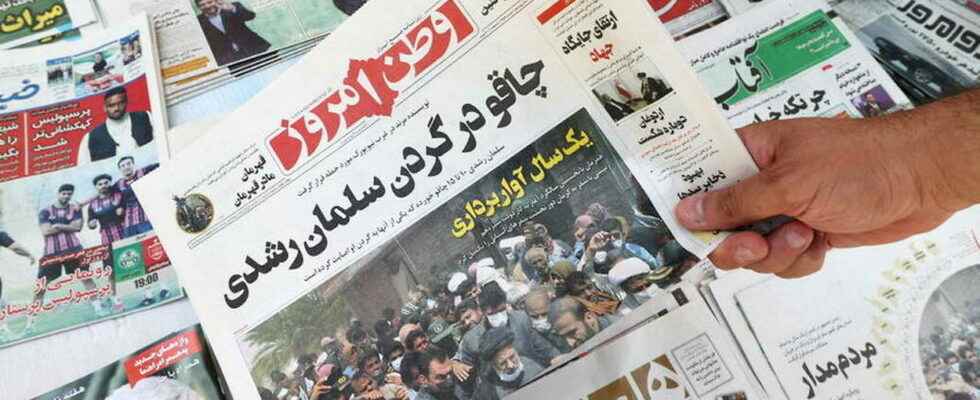Lislamists never forget. We do. Salman Rushdie’s aggression forces us to face up to what constitutes one of the main weaknesses of Western democracies in the fight against political Islam. The jihadists are engaged in a fight that is played out for them over decades, even centuries. It doesn’t matter to them that thirty years pass before the planned execution of a human being. The main thing is to confront again and again regimes that refuse to submit the individual to a totalitarian ideology. Therefore, there is nothing really surprising in this sad event.
On the other hand, what continues to be worrying lies in our psychological disarmament which permanently weakens our ability to provide a relevant response to Islamist violence. In this case, here, the decision of the cultural center of Chautauqua not to install any particular protection device to secure the conference of the writer, yet threatened for thirty years. This imperviousness to the world raises questions. What motivations can explain this lightness? We understand the surface argument, of course, that of not setting up a distance between the speaker and the public, so as not to undermine the conviviality of this type of event. But what of the true intellectual and psychological dynamics which allows to favor the “imperative” of relaxed relations with the room on the evidence of the dangerousness of such a choice?
The answer is clear. Many believe that Khomeini’s fatwa is a thing of the past… This mental mechanism will always be fatal to us: we fail to understand that we are at war against an ideology feeding its followers with the theme of a confrontation to the death against the “godless”.
READ ALSORoberto Saviano: “Faced with Islamist fanaticism, Salman Rushdie chose life and freedom”
The direct operational consequence of this state of mind is that our level of vigilance has again dropped. The analysis of reality has once again yielded to the illusory comfort of the apparent reduction in the frequency of attacks. I say “apparent” because the reality is more complex. The “vogue” of stabbings is not neutral: putting everything on the account of psychiatric disorders does not really hold water. This can even be seen as a significant part of our problem: improperly “psychologizing” Islamist terrorism amounts to refusing to see it, to burying our heads in the sand by trivializing criminal logics that must be explained in a multifactorial way, of course, while clearly seeing what they borrow from the theories of Salafist jihadism, from the Muslim Brotherhood project and from all the ideological alluviums of ideological Islam, to use the formula of Amélie Chelly, author of a fascinating Dictionary of Islamisms.Persecution, depression and megalomania
If we go a little deeper into the subject, we can easily see the detail. In The Factory of the Lonely Terrorist, the clinical psychologist Patricia Cotti explains in a very interesting way that it is necessary to decipher the jihadists from three psychic poles: the victim position (persecution), the apocalyptic vision of the world (depression), and the exaltation of the ideal self. (megalomania). It follows, first, that the individuals in question remain responsible for their actions in the overwhelming majority of cases; second, that they export into the collective universe a sense of failure and persecution that they feel individually and which constitutes an easy way to exonerate themselves from their own shortcomings; thirdly, that the complex mechanics of radicalization prior to acting out is not exhausted in their troubles. It is indeed an ideology and its actors who instrumentalize them, so that there is a strategy against which we must fight, as well as a context which makes possible the conjunction between personal flaws and a totalitarian and criminal ambition.
What we don’t want to see is the permanence of the danger, and even its growing sophistication. It is both the Islamist “soft power” that is progressing and its ability to generate daily “low intensity” violence (if such a formula can be used, in itself atrocious since the experience of our fellow citizens in fact often becomes unbearable or at least unacceptable).
casualness
Concretely, this means that many public and private organizations, many sites open to the public, especially tourist sites, are now much more casual about their security conditions.
One would sometimes think that the killing of Charlie Hebdo and the Bataclan did not exist. That Nice has never known the horror of unbearable violence, that Colonel Arnaud Beltrame has not sacrificed his life to preserve others, that a priest has never been assassinated in his church, that never had a teacher beheaded while trying to teach children about freedom of speech, etc. The film November by Cédric Jimenez comes out in early October: it will remind all amnesiacs of what jihadism means, the suffering it causes, the horror it projects into bodies and minds. Since 2018, awareness of the jihadist threat has declined. The attack on Salman Rushdie warns us. Will we heed this warning?
READ ALSO“November”: solid thriller, but with a taste of unfinished
* Homeland security expert, author of The permanent insecurity (editions of Cerf)
